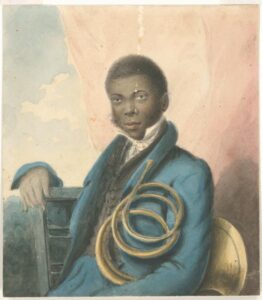
A Trailblazing Musician and Composer
Francis Johnson (1792-1844) was a composer, musician, and bandleader whose innovations left an indelible mark on American music. He stands out as one of the first African American composers to publish his music and the first to have his works performed by an integrated orchestra. His contributions spanned various genres, including military marches, dance music, and compositions for brass bands, making him a versatile and influential figure in his time.
Virtuoso and Innovator
Johnson was celebrated for his virtuosic cornet playing and his ability to lead bands that captivated audiences across the United States and Europe. His European tour in the 1830s was groundbreaking, making him one of the first African American musicians to gain international acclaim. During this tour, Johnson not only showcased his exceptional talent but also demonstrated the global potential of African American musicians.
One of Johnson’s most notable achievements was his role in introducing and popularizing the promenade concert style in America. These concerts, characterized by their relaxed, social atmosphere, later evolved into the modern-day concert band tradition. Johnson’s compositions, such as “The Recognition March on the Arrival of the President of the United States,” showcased his talent for creating vibrant and dynamic music that resonated with diverse audiences. His ability to blend different musical styles and cater to the tastes of his audience made him a celebrated figure in American music.
Overcoming Racial Barriers
Johnson’s legacy is a testament to his musical brilliance and his role as a trailblazer in the face of significant racial barriers. Despite the pervasive racism of his time, he managed to achieve remarkable success and influence. His work paved the way for future generations of African American musicians, highlighting the importance of diversity and innovation in the arts.
Johnson’s success was not merely a personal triumph but a breakthrough for African American musicians, who were often marginalized and excluded from mainstream music circles. His achievements demonstrated that talent and creativity could transcend racial barriers, inspiring many who followed in his footsteps.
